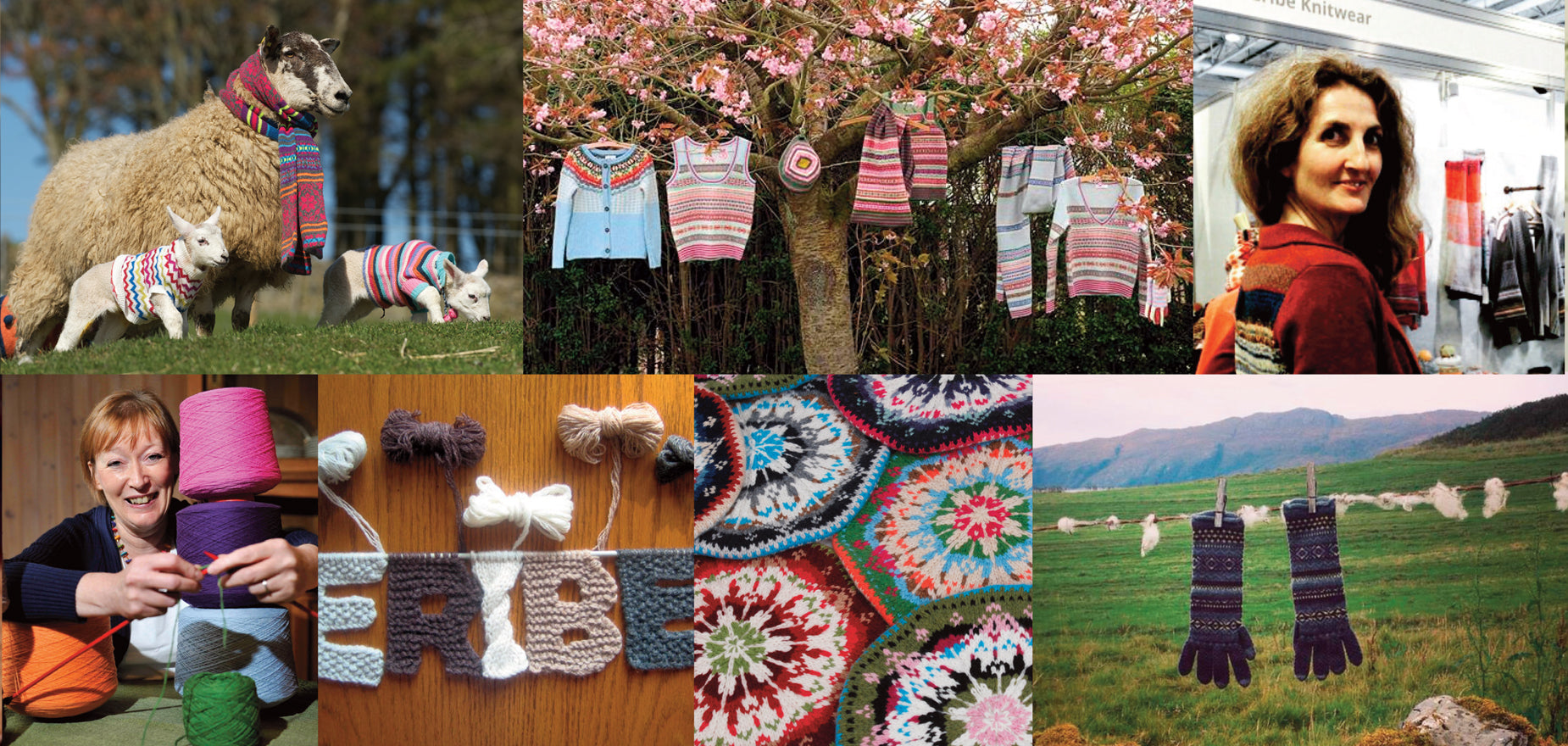
OUR HISTORY
Born out of a desire for creative freedom and a fascination with knitwear, Rosemary Eribé set up ERIBÉ Knitwear in 1986. From humble beginnings, ERIBÉ has grown to be global player in designer Scottish knitwear.
Chapter I
After high-school, Rosemary became a retail management apprentice in Hamburg, Germany. The experience was eye-opening, she learned about two very important and inter-related matters; human nature and sales. She also came to the realisation that she wanted to start her own company to have the freedom to learn and create. This very early experience of employment has gone on to shape her entire working life.
Chapter II
Upon returning to Scotland, Rosemary went to study at the prestigious Scottish College of Textiles (now Herriot-Watt University) in Galashiels, Scottish Borders. Specialising in knitwear, after four years she graduated with a first-class honours degree. Rosemary went on to win a coveted place on a graduate enterprise course at Stirling University and St Margaret’s College, Edinburgh. On this course, she learned invaluable business management skills.
Despite leaving college with miniscule funds, Rosemary had a dream, and a very supportive family, and ERIBÉ Knitwear was born!
Chapter III
Early on, it became apparent to Rosemary that the best opportunities lay in exporting. In the late 1980’s, after conducting months of research, she organised a designer collective and found an American trade show for them to exhibit at. This trade show, combined with a dash of persistence, lead to Rosemary managing to build an overflowing Filofax of prestigious customers, all clamouring to buy her cashmere designs.
Rosemary’s zest for learning meant that she saw exporting to America as a way to study their culture. She discovered that Americans adore innovation, they are fascinated with what’s new and fresh, and have a deep connection to their heritage. They love the idea of Scotland and ERIBÉ’s lifestyle products conjure up this romantic nostalgic vision for them.
This was a big success, the Japanese loved that Rosemary was a designer first and foremost. They also find high-quality products irresistible and recognise the luxuriousness of ERIBÉ’s cashmere pieces. In order to fulfil her orders Rosemary partnered with Mike Smith, an experienced exporter. He saw great potential in her and opened a new factory in the Scottish Borders to manufacture her orders to a very high standard.
Whilst in America Rosemary had learned about trends; but in Japan she learnt about business management; everything from transparency and sharing knowledge to communication and loyalty. She also learned of the great cultural connection between Japan and the UK. Both have a wonderful island mentality that celebrates community spirit, support and clear communication.
Chapter IV
Rosemary soon realised this love for Scotland extends all around the world. The Japanese also appreciate authentic Scottish products. This knowledge prompted Rosemary to set her sights to expand into Japan in the late 1980s. After the success in America and Japan, two great things happened simultaneously in the early 1990s. Rosemary began conducting research into Germany as a potential market for ERIBÉ. Being fluent in German, she began to investigate the possibility of an all-Scottish ecological product. Once again, she attended trade fairs to introduce herself to buyers and customers. What makes Germany a special market is that they love to learn how a product has been made and all its intricate details. Rosemary focused on marketing products to Germany which used the finest quality yarns such as cashmere and their Shetland wool range.
In the beginning, the principal yarn was cashmere, but as time has gone on ERIBÉ have diversified to include other high-quality wools such as lambswool, camel hair and mohair.
After careful consideration of product specifications, wool properties and the production process, ERIBÉ established their award-winning Shetland wool collection in 1994. Originally, launched as Drystane it was later rebranded as Ecology. By working with trusted spinners, Rosemary succeeded in minimising the carbon footprint of each garment.
Chapter V
ERIBÉ bought over a Scottish hand-knitting company called Hermione Spencer in 1999. A year later Rosemary launch the striking hand-knitting range.
Chapter VI
The ERIBÉ design team are considered experts in the intricate knitting technique of Fairisle (Fair isle). Since 2000, they have been innovating Fairisle patterns and exploring the possibilities of this heritage technique. Read about the history behind Fairisle.
In early 2001, after being inspired by an art exhibition, Rosemary developed beautiful hand-painted cashmere. It took Rosemary months to find the perfect natural dye that was permanent but left the cashmere soft whilst being natural and sustainable. Garments were turned into ‘artwear’ by using the finest 1-ply cashmere garments as a canvas to paint on.
Recent developments have seen ERIBÉ continue on their export success, grow their team to 12 and launch an ecommerce site.
